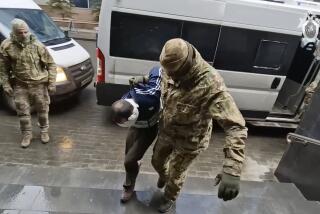Armed Rebels Force Tajikistan Leader to Quit
- Share via
MOSCOW — Besieged at the local airport by armed rebels, the hard-line president of Tajikistan was forced to resign Monday in the climax to months of bloodshed and political battles in the former Soviet republic.
President Rakhman Nabiyev, 61, signed his resignation under pressure from militants so hostile that they declared he “has no right to live,” Russia’s Itar-Tass news agency reported from the Tajik capital, Dushanbe. By Monday night, however, Nabiyev was still reportedly alive and being held at a government rest-house.
His ouster must be ratified by Tajik lawmakers. Parliament’s governing council voted Monday night to accept his resignation.
As at least one leader of a neighboring republic expressed concern about the stability of peace in the region, the nature of leadership in Tajikistan remained unclear, with opposition forces split between Western-style liberals and Islamic fundamentalists. Opposition members said Monday that no successor to Nabiyev has been chosen.
The chairman of Parliament is expected to take over the presidency temporarily. Many legislators predict that Tajikistan may forsake presidential rule altogether and give more power to Parliament on the theory that one man cannot represent all the conflicting groups in the country.
Nabiyev, who had served as the old Communist Party boss of Tajikistan, is the third elected president of a former Soviet republic to be removed this year.
Georgia’s president, Zviad Gamsakhurdia, fled a violent rebellion in his homeland, and Ayaz Mutalibov of Azerbaijan resigned under powerful opposition pressure. Each leader fell for a different local reason. But they appeared alike in their inability to cope with the rapid political change that has accompanied the collapse of the Soviet Union.
Since Nabiyev was voted back into power last November, his impoverished Central Asian country of 5 million has been racked by unrelenting political unrest, clan wars and regional struggles that have left hundreds dead.
In a brief televised speech Monday night, Nabiyev said that he resigned “in the interests of further stabilization, to stop further fratricide.” The burly, snowy-haired president looked perturbed, his dark brows lowered and his mouth so dry that smacking his tongue against the roof of his mouth did not appear to help.
Reports on Monday from Kurgan-Tyube--the southern Tajik region where heavy fighting between pro- and anti-Nabiyev forces broke out last week--told of corpses littering the city, hospitals overflowing and militants roaming the streets, armed with weapons made everywhere from Israel to China.
“There are fires in the city, marauders,” the newspaper Izvestia said. “Once again, there are hundreds of mutilated, disfigured corpses. And everywhere are armed men with no clear command over them.”
Civil warfare in Tajikistan intensified last week after rebels stormed Nabiyev’s seat of power, the presidential palace, in Dushanbe, and forced him to vacate it. But Nabiyev still refused to resign, even after his own Cabinet declared that it no longer considered him to be Tajikistan’s leader.
Nabiyev’s opponents accuse him of holding back reforms in Tajikistan, the poorest of the former Soviet republics. But clan and regional politics also played a role in his fate. Rebels asserted that his region, the northern area around Leninabad, had dominated Tajikistan for the past decades.
Nabiyev was reportedly preparing to fly to Leninabad to appeal to lawmakers there for help when he was intercepted at the airport, and the VIP hall there was surrounded by hundreds of people variously described as armed rebels or angry refugees from the worst areas of fighting. Reports said the protesters identified themselves as the same group that took over the presidential palace last week, the “Youth of Dushanbe.”
Islam Karimov, president of neighboring Uzbekistan, said Monday that he worries that Tajikistan’s unrest could ignite more of the same across Central Asia, the sprawling southern flank of the former Soviet Union united mainly by Islam and Third World-style poverty. Karimov also expressed deep concern about lack of control at Tajikistan’s border with Afghanistan, which appears to explain massive quantities of arms that have made their way into Tajikistan.
Afghans and Tajiks have both been defying border guards and trying to pass freely between the two countries in recent days, prompting guards to kill at least two who crossed the frontier.
Dushanbe itself was reported quiet Monday night, with no sign of the protests that took place much of last week and occurred during a full six weeks last fall.
But the lull may not last. Russian Television reported that many Tajiks doubt that Nabiyev will fully retire from politics; opposition members fear that his strongholds, the Leninabad and Kulyab districts, will now battle any new government.
More to Read
Sign up for Essential California
The most important California stories and recommendations in your inbox every morning.
You may occasionally receive promotional content from the Los Angeles Times.













